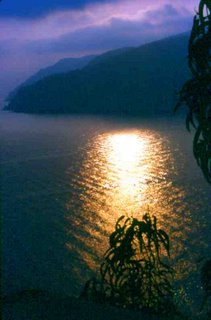
The tiny Ligurian town of Moneglia on Italy’s Mediterranean coast had a sandy beach, rich history, and ancient streets lined with colorful houses, regal shade trees and charming shops.
But we pretty much stayed put on our perch high above the hamlet and spent the week looking down on everyone.
We’d rented the best-sited of the apartments at a small hilltop complex called Residence Le Marine, an aerie suspended above the Ligurian land and seascape.
We had three floors of living space, two bathrooms, and a massive, tiled terrace that yielded soul-stirring views of the town, sea, mountainous coastline of the Riviera Levante, and the setting sun's nightly dance to below the horizon. The performance opened with deep peach and blood-orange and closed a few hours later with burgundy-grape before fading to a beautiful black.
Other than to buy food, we saw little reason to leave our lofty piece of paradise.
We bought our wine right on the property, from the hands that picked and pressed the grapes. The brother and sister who owned the complex sold their homegrown vintages, red and white, for about four dollars a bottle at the reception desk. When we emptied a bottle, we brought it back to the lobby for a refill. That’s customer service.
If we could have lived on fruit alone, we wouldn’t have even had to leave campus for groceries. On several late afternoons, we found plastic bags filled with fresh-picked apricots hanging on our front doorknob. Who had left these delicious gifts?
A German family was renting the apartment behind ours. (Their rent was half what we were paying, but they had no terrace, no view and no idea what they were missing. I’m frugal, but in this setting, going for the upgrade not only added to the vacation, it was the vacation.) Each morning the Germans set out for long, hilly hikes (probably because they had no terrace and no view so, unlike us, no reason to stay home).
After the second or third apricot appearance, I hypothesized that the Germans went fruit-picking on their hikes and were sharing their bounty. They were a friendly, outgoing clan, so this theory seemed plausible. I’d practiced my German on them a few times, and, unlike some Europeans who've shown impatience with my clumsy attempts to connect colloquially by lobbing perfect English back at me, these folks enjoyed my linguistic forays into their land of umlauts and guttural stops and even encouraged me to keep sprechen-ing.
One day I passed them in the parking lot and thanked them for “the fruit.” “Danke sehr fur die Fruchte.” (I had to use the general term, as I didn’t know the word for “apricots.” Babel Fish just taught me it’s “die Aprikosen.”)
“Ach, nein!” laughed the father. “Nicht von uns.” No, they hadn’t hung the apricots. The sun-colored fruits, explained the father, were gifts from “der Bruder and die Schwester,” the Marine’s sibling owners.
That evening, as we watched the golden orb sink into the sea, we opened the day’s sack of apricots, paired the perfect fruit from our landlords’ orchards with a crisp white from their vineyards (and lobby), saluted the sun, and toasted la dolce vita.
(Note: We rented our Residence Le Marine apartment through Interhome, an agency I’ve used several times with excellent results. In preparing this post, I searched Interhome without luck for a Residence Le Marine listing. I then Googled the property name and found it listed with Sologstrand, a Danish holiday rental agency.)
